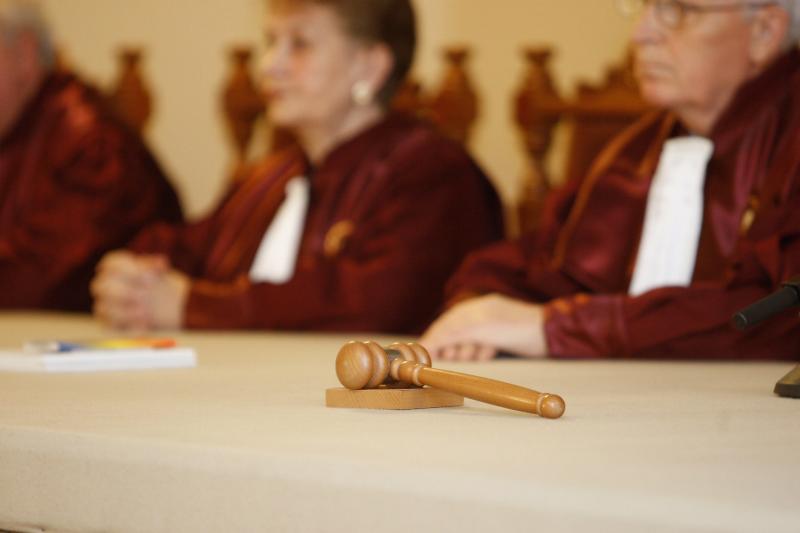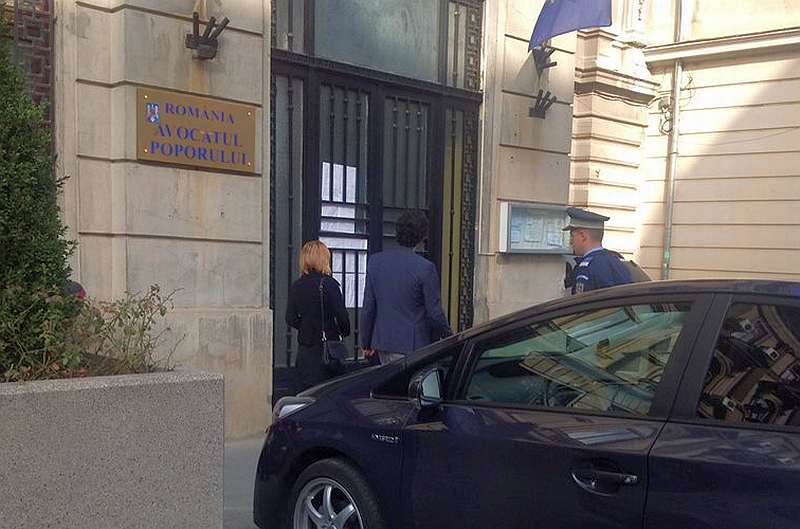AMICUS CURIAE Regarding File no. 904AI/2013 of the Constitutional Court , due on January 22, 2014
17.01.14
Prepared by the Association for the Defence of Human Rights in Romania – Helsinki Committee
(APADOR-CH)
Supported by:
ActiveWatch – the Press Monitoring Agency
The National Alliance of Student Organizations in Romania – ANOSR
ACCEPT Association
Spiritual Militia Civic Movement
The National Association of Citizen Counseling Offices
The Association for Technology and the Internet
“Save the Danube and Delta” Association
The Legal Resource Center
The Resource Center for Public Participation
The Euro-Regional Center for Public Initiatives
The Center for Independent Journalism
The Romanian Center for European Policies
PACT Foundation
SOROS Foundation Romania
The Public Policies Institute
Romani CRISS, executive director Marian Mandache
Romanian Harm Reduction Network, executive director Valentin Simionov
The signatory organizations know that, procedurally speaking, they have no quality to intervene (as a party) in this constitutional case.
That is exactly why they are filing the present amicus curie brief, a legal institution that differs from that of the intervention and has been integrated into most common law systems, such as the European Court of Human Rights.
An amicus curiae is someone who has expertise in a certain filed (in this case, human rights and freedom of association) and can assist the court (hence the name, meaning literally friend of the court) by providing relevant information/observations for an important cause, with a consultative role.
Recently, the Constitutional Court explicitly recognized the quality of amicus curie of a NGO in its judgment no. 447 of October 29, 2013 on the constitutional challenge of Government Emergency Ordinance no. 91/2013 on insolvency procedures and prevention methods.
In that respect, the aforementioned judgment states, on page 5: “An opinion has been added to the file, from the Association for the Defence of Human Rights in Romania – the Helsinki Committee, acting as amicus curiae, to support the constitutional challenge of art. 81, par. 3, and of art. 348 of Government Emergency Ordinance no. 91/2013. ”
*
In the present case, the President of Romania, prior to signing the Law for the amendment of Government Ordinance no. 26/2000 on associations and foundations, has notified the Constitutional Court on a constitutional challenge.
The signatory organizations support the move of the President, pointing out that the aforesaid amendments seriously impair the exercise of the right to free association , guaranteed by Article 40 of the Constitution and by Article 11 of the European Convention of Human Rights. The amendments provide, among others, the legal dissolution, for unpredictable reasons , applied retroactively , of several associations and foundations which were created in perfect legality and have functioned for a long time, some of them well known to the public.
In that respect, the signatory organizations point out that article II of the Law for the amendment of Government Ordinance no. 26/2000 on associations and foundations violates the principle of irretroactivity of law (provided by art. 15, par. 2 of the Constitution), the principle of separation of powers (art. 1, par. 4 of the Constitution) and the principle of res judicata for final and irrevocable judgments (art. 126, par. 1 of the Constitution), as well as the right to freedom of association guaranteed by article 40, par. 1 of the Constitution.
Art. II of the legislative proposal provides:
“ ART.II (1) Associations, foundations or federations which have been legally created before the current law came into effectare under obligation to change their name , as long as they fall under the provisions of Article 7, paragraph (3), (3/1) and paragraph (3/3)-(3/5) of Government Ordinance no. 26/2000 on associations and foundations, approved with amendments by Law no.246/2005, with subsequent modifications, including those brought by the current law.
(2) Failing to fulfill the obligation under paragraph (1) results in the dissolution and radiation from the Registry of Associations and Foundations, after a 2 year term within which associations, foundations and federations are allowed to use the original name, alongside the new one.
(3) Dissolution must b notified by a decision of the court of justice from the area where the legal persons under par. (1) have their legal headquarters, at the request of any interested part.”
That means that the names of associations and foundations created in accordance with the law in effect at the respective time and validated by the court, through irrevocable judgments, must be modified as a retroactive effect of the new law which, without any constitutional grounds, ceases to recognize and even dissolves the legal relations established by virtue of the old law.
It must be underlined that article II of the new law reopens irrevocable judgments that established with the authority of res judicata that the creation of the NGOs observed all legal conditions in effect at that time, including provisions related to the name of organizations.
The signatory organizations point out that one cannot change the conditions for the creation of a legal person by a law that applies retroactively unless one ignores the principle of irretroactivity of law. Also, passing laws that annul final court judgments is a violation of the separation of powers and of the res judicata principle.
On the other hand, in the case of associations and foundations, the name is a very important element of identification, closely related to their reputation and the way they are known and perceived by society. It is a connection similar to that between a person and his/her name.
If a law was passed to oblige persons to change their names under penalty of being eliminated from society, despite the fact that their names were legally chosen and bestowed at the time of birth, it would surely be considered absurd.
And if such a regulation seems absurd and extremely dangerous for physical persons, it is absurd and extremely dangerous in the case of legal persons such as associations or foundations, for the same reasons.
The arbitrary modification of essential attributes of a person – such as the name, equally important to legal and to physical persons – results in the loss of identity and consequently exclusion from the public space and society. Such a practice has nothing to do with a democratic society.
Under such circumstances, one may ask how associations and foundations can run their activities when they have no certainty about their own existence, when they can be dissolved for reasons related to their creation (the name), although the courts of law irrevocably established they were created in full accordance with the law (including the name).
One may also ask how NGOs will be able to function, attract new members, apply for project funding and develop as institutions when they are permanently threatened with dissolution for an alleged infringement of regulations coming from the future to re-judge the past.
This state of serious incertitude related to the legal existence of associations and foundations is of nature to prevent the normal exercise of the right to association, granted by Article 40, par. 1 of the Constitution and by Article 11 of the European Convention for Human Rights.
The signatory organizations also bring a historical argument in support of the constitutional challenge: a provision similar to Art. II of the law under discussion had been introduced in Government Ordinance no. 26/2000 through Law no. 305/20081 (even the numbering was identical, because that article was also no. II). But shortly after the provision was introduced (about three months later) the text was eliminated (by Emergency Ordinance no. 16/2009, approved by Law no. 263/2009), because it was noted that the wording had created major uncertainties regarding the situation of associations/foundations created prior to the amendment, whose legality had been verified by courts of law at the time of their creation.
Moreover, the substantiation note of EO 16/2009 mentions that the introduction of new legal conditions cannot impose sanctions on already established associations and foundations, since the regulation was not applicable to them at the time of their creation. Also, it was noted that the new regulation menaced to create serious dysfunctions in the activity of associations and foundations, so the only effective remedy was to abrogate it.
We quote from the substantiation note of EO 16/2009, abrogating a provision similar to Art II of the Law under discussion.
“ What is more, the principle of irretroactivity of the law is completely ignored by these imperative retroactive conditions , that aim at the very existence of legally established entities, in full observance of the laws in force at the time of their creation and having produced proof that their names were legally available from the Ministry of Justice, which provided control over the names chosen by the organizations at the time of their creation .”
Therefore, it’s not for the first time that the Parliaments tries to amend Government Ordinance no. 26/2000 by introducing a unconstitutional retroactive legal provision that would dissolve legally created and court endorsed associations and foundations.
Upon the first attempt made by the Parliament in 2008, the Government reacted with celerity (at the request of the civil society) and abrogated the unconstitutional provision. This time, in 2014, we believe it is the full responsibility of the Constitutional Court to block the same unconstitutional provision, reintroduced by the Parliament five years after their failed attempt.
*
In conclusion, the signatory organizations ask the Constitutional Court to accept the constitutional challenge raised by the Romanian President with regard to the Law for the amendment of Government Ordinance no. 26/2000.
1 Text of Art II of Law no. 305/2008, abrogated by EO 16/2009:
“ Art. II. – Associations and foundations whose names contravene to art. 7, par. (3) of Government Ordinance no. 26/2000 on associations and foundations, approved with amendments by Law no. 246/2005, with further amendments brought by the present law, are under obligation to modify their names within 6 months from the moment the present law comes into force, under sanction of dissolution by court decision, upon the request of any interested authority, institution or person . .”





